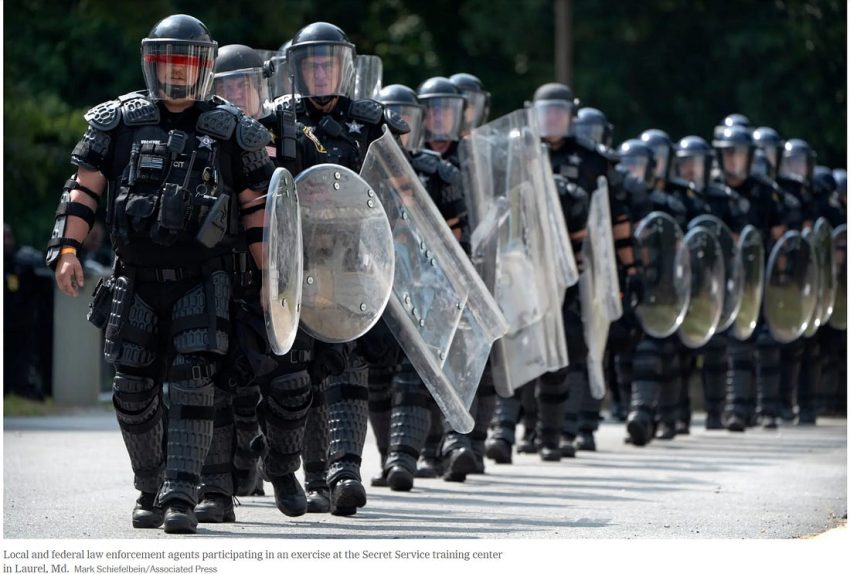EDITOR’S NOTE: Here’s an installment from Tillamook County’s State Representative Cyrus Javadi’s Substack blog, “A Point of Personal Privilege.” Oregon legislator and local dentist. Representing District 32, a focus on practical policies and community well-being. This space offers insights on state issues, reflections on leadership, and stories from the Oregon coast, fostering thoughtful dialogue. Posted on Substack, 11/16/25
A reminder that raids, secrecy, and mystery facilities are not a governing philosophy.
By State Representative Cyrus Javadi
Are You Afraid?
I keep asking myself this question. And, not because I enjoy spiraling into existential dread, but because last week on the Oregon Coast, fear wasn’t theoretical. It was observable. It had a pulse.
People weren’t running through the streets or boarding up windows. It wasn’t that kind of fear. It was quieter. The kind that shows up in half-finished texts and parents keeping kids home from school “just to be safe.” The kind that sits in your chest like a weight because something feels off and you can’t quite believe it’s happening in a country that’s supposed to know better.
That’s what it felt like in Seaside after six people were picked up by armed, masked men in front of a bookstore. The whole scene looked less like 2025 Oregon and more like the opening scene of a political thriller.
That’s not normal.
And it’s not supposed to be.
This Is Oregon, Not a Spy Thriller
Let’s be honest. Oregon is many things. Quirky. Beautiful. Damp. Occasionally scented like hemp and coffee. What it is not, or at least what it’s not supposed to be, is a place where the federal government runs mystery operations like they’re auditioning for the next season of Jack Ryan.
But here we are.
A federal judge recently found that ICE agents were basically treating Oregon highways like a Vegas slot machine: spin the license plate scanner, see what pops up.
No targeted suspect. No warrant. Just scanning “vehicles traveling around them.”
You know, the type of thing that should make every constitutional conservative develop an eye twitch. One of those random scans led to the arrest of a local father who was following all his check-in rules.
And for those of you who think the father deserved it, the judge disagreed. He said ICE’s explanation was “dubious.”¹
That’s judge-speak for “Come on, guys.”
Randomized law enforcement is not a “strategy.” It’s throwing darts in the dark and hoping you don’t hit a toddler.
And then there’s Newport.
If you haven’t followed this storyline, it has all the qualities of a government plot twist. Out of nowhere, job postings start appearing for detention officers and nurses and sewage technicians capable of pumping enough waste to irrigate Nevada.
Then the Coast Guard helicopter, the one used to pull crabbers out of the ocean during storms, gets quietly moved to North Bend. No press release. No public meeting. Just… gone.
So residents did what you and I would do: they connected the dots.
Detention jobs.
Massive sewage capacity.
Four acres of airport land.
Rescue helicopter gone.
If you want to unsettle a small town, that’s how you do it.
People were upset. Not mildly annoyed. No, they were genuinely, stomach-tighteningly upset. Because it looked like the federal government was preparing to drop a detention center into their community and was deliberately avoiding telling anyone about it. That’s the kind of thing that makes even calm, rational Oregonians say, “Hold on. What are you building here?”
And when city officials asked questions, federal officials responded with the enthusiasm of someone being asked whether they remembered to feed the neighbor’s cat.
So yes, people were afraid.
Not because they’d done anything wrong.
But because the government was acting like it had something to hide.²
And the thing about fear is this: it doesn’t stay local. It spreads. It jumps from coast to valley to city to suburb, because once you realize the rules are shifting, you start to wonder where else the line is moving.
Which brings us to the people living this fear most directly.
You don’t have to imagine what this looks like in real life. You can just ask someone who’s already been through it.
Ask Jackie Merlos What This Looks Like in Real Life
Policies are easier to defend when they’re abstract. When they don’t have names or faces. But once you attach a real human being to them, things get clearer, and darker, very quickly.
Take Jackie Merlos, a crime victim with a pending U visa (someone who was a victim of a serous crime). She was following the rules…aka, she was doing what the law asks of people who want to stay here.
And still she was detained for four months after a family visit to Canada. Her four American children were separated from her. Agents threatened to send them to Honduras. They drove her to her home in Portland without a warrant and rummaged through the place like they were looking for Narnia.³
The part that got me was when she said she wondered whether her children would forget her face.
It’s difficult to hear stories like this and maintain the illusion that everything happening right now is measured and precise and justified.
It isn’t.
Charlotte, North Carolina, Is a Preview of Coming Attractions
If you want to see how bad this can get, look at Charlotte.
In a single day, 81 people were arrested in neighborhoods nowhere near a border. Church services canceled. Classes missed. Nightclubs closed. A U.S. citizen had his truck window smashed by an agent. Vendors at the Hispanic flea market stopped showing up out of fear.⁴
There was no clear targeting. No list. No hierarchy of danger. Just presence. Lots of it. And the message was unmistakable: anyone could be next.
Federal officials said they could not say how long the operation would last.
Of course they couldn’t. This type of mission creep doesn’t come with a calendar.
The Department of Homeland Security Has Become the Department of Deportation
Here’s the part that should worry literally everyone.
To pull off these raids, DHS has reassigned thousands of agents away from the things conservatives and liberals actually agree matter like stopping child exploitation, sex trafficking, cybercrime, and drug smuggling.⁵
The New York Times found that from February to April, investigators worked about one-third fewer hours on child exploitation cases. Not because predators went on vacation. Because agents were reassigned to immigration sweeps.
Counterterrorism probes slowed. Iranian oil-smuggling enforcement slowed. Drug interdiction slowed. The Coast Guard was pulled off rescues to help with detention logistics.
If you support “law and order,” it might help to remember that law and order is more than immigration paperwork. It includes child protection. National security. Stopping fentanyl. Saving drowning fishermen.
This is not law enforcement.
And the cost is real.
Fear Is Not Policy
A country doesn’t lose its way in a single catastrophic event. It loses its way in the smaller silences like the moments when regular people look at something obviously wrong and decide to pretend it’s fine because pointing it out feels inconvenient.
But this is not fine.
What happened in Seaside was not fine.
What’s happening in Newport is not fine.
What happened to Jackie Merlos was not fine.
What’s happening in Charlotte is not fine.
And what DHS is doing to its own mission is absolutely not fine.
You don’t keep a country strong by making its people afraid of unmarked SUVs.
You don’t defend liberty by randomizing enforcement.
You don’t strengthen institutions by hollowing out their actual purpose.
We can have real debates about immigration. Good ones. Necessary ones. But fear is not a substitute for policy. And a government that makes its people afraid—citizens, immigrants, families, neighbors — is a government that has forgotten who it works for.
We deserve better than fear.
And we should demand it.
Footnotes
1. Oregonian reporting on ICE’s random license-plate scans in Beaverton.
2. Oregonian reporting on the Newport ICE facility planning, Coast Guard redeployment, and related job postings.
3. Oregonian reporting on Jackie Merlos’ detention and family separation.
4. New York Times reporting on the Charlotte immigration raids.
5. New York Times investigation into DHS mission diversion and national-security consequences.
Look, I’m supposed to tell you to subscribe here.
So: subscribe.
Not because it makes me rich (it doesn’t), but because if we want a country governed by grown-ups instead of fear, we need more people actually paying attention.


